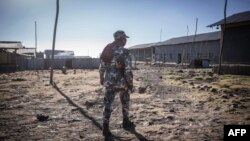Ethiopian lawmakers voted Tuesday to lift a state of emergency in place since November, enacted when forces from the Tigray region threatened to move in on the capital. Tigrayan forces later pulled back to Tigray in late December, but observers say the warring parties are effectively at a standoff. Despite the lifting of the state of emergency, the Ethiopian government has yet to release thousands of civilians detained under the emergency law and held without due process.
The state-run Human Rights Commission has welcomed the Ethiopian Parliament’s decision to end the six-month state of emergency. However, the state rights body urged further efforts to address the issue of those imprisoned for the past three months, and still imprisoned, under the law.
Misganaw Mulugeta, the commission’s investigation director, called for authorities to take action.
"There are a number of cases we have been closely following, but we do not have all the data about the suspects detained in all parts of the country during the past months. So, the evidence we have is that there are a number of people who are still in custody in connection with the state of emergency. If it is going to be lifted, they should be set free or get their cases reviewed through regular due process," Misganaw said.
Those behind bars in many parts of the country should appear before a court, Misganaw said, and be granted the right to have an attorney and other legal access.
The Human Rights Commission raised further concerns about people who were released after being held under the law. Even released prisoners are not getting proper clearance letters from authorities that would essentially allow them to go back to work, Misganaw said. The rights group said they are receiving complaints from people affected by the delay, and have shared the matter with appropriate authorities, Misganaw added.
Under the state of emergency, many civilians, mostly ethnic Tigrayans, have been arbitrarily arrested, accused of supporting the Tigray regional leadership, according to international rights groups such as Human Rights Watch and Amnesty International. The advocacy groups say the law has been used for enforce disappearances, torture, extrajudicial executions, and other abuses against ethnic Tigrayans residing in the capital, Addis Ababa, and other regional cities.
Although Ethiopia’s House of People’s Representatives or the parliament rarely goes against Ethiopia's executive body, the decision to lift the law is a step in the right direction, but only a step, says William Davison, a senior analyst for the International Crisis Group.
“Removing the state of emergency will hopefully lead to a reduction in arbitrary detention, hopefully, we will also see the release of all who have been detained without due process. But there is no particular reason to think that just a removal of the state of emergency will solve the political problem driving security problem in Oromia, in Tigray and elsewhere in the country,” he said.
Davison says the state should free the remaining detainees, including high-profile political leaders from across the Oromia region and other regions. He recommended that all parties in the conflict work to ease tension and engage further in constructive negotiations.
VOA reached out to Jeylan Abdi, the Ethiopian Federal Police Commission public relations officer, but he did not respond to an inquiry about demands from the commission to release prisoners or issue clearances for the resumption of work to those released.
Misganaw says the commission will keep appealing to state authorities on the country’s pressing human rights issues but getting an appropriate response may not be immediate, he added.




